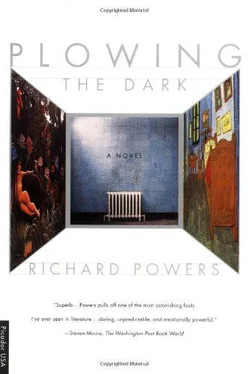Artist and musician were joined at the hip. Their pact with their newly adopted poet excluded Stevie even as they tutored him. Spiegel doubted whether two people ought to be that close. Yet he drew closer to them, ready to swap places with either or take up any kind of triple orbit they asked, however unstable.
Ted dismantled Stevie in several dozen consecutive games of handball before luck and desperate caginess gave Spiegel his first two-point win. By then, between games, they'd worked their way through Schoenberg's Pierrot and Second String Quartet together, and Spiegel had begun to feel the air of another planet.
Zimmerman demanded reciprocal gifts of allegiance, scouting reports from lands he hadn't yet reached. Stevie obliged with pleasure, with memorized parcels of Eliot and Stevens, stray trinkets for the two of them to analyze that shared no common thread except the thrill of discovery and the whiff of bewilderment. But always Yeats: Spiegel returned to the man with such persistence that Zimmerman finally gave up trying to break him of the obsession.
Adie rode them both. "Do you two aesthetes ever read anyone who hasn't been dead for decades?"
A decade and a half had passed. Now they were all dead. The joints that had limbered in that brief spring had all ossified. Klarpol and Spiegel, or their stiff adult puppets, straddled the amber planks of a Cavern that now resembled one of those rental storage sheds along the side of the interstate. No country for old men. Two adults, already fossil, stood with a youth completely unlike the one they'd both loved, a boy no more than the placeholder for a man whose life had peaked at
twenty-three.
The Cavern filled with colored boxes, transparent shipping containers stacked against its walls. Spiegel, Adie, and Jackdaw milled about among the marker blocks, passing right through the spectral surfaces as they surveyed them.
Adie cast a cold eye over the consolidating bedroom. The second chair looks too big. We need to scoot the washstand three inches to the
left.
The three of them hacked a path forward, advancing to the steady rhythm of prototype, tweak, prototype. Seattle and Aries differed so greatly that only the most desperate gaze could shoehorn the one into
the other.
Just such desperate looking had set Spiegel loose, back in that free-range spring. He'd never thought to indulge in it before that May. Now no more beautiful a town on earth existed than their little bandit's roost. Across the campus, trees broke out in absurd petaled profusion. Life returned to life, sporting a spin, strangeness, and charm that Spiegel had never suspected.
All things merited writing home about, now that he had his own address. All things turned worth describing. Writing became what he did. He wrote about what passed for landscape, there in the Midwest. He wrote about secondhand clothes in a thrift shop. He wrote about liquor store parking lots. He stood in front of Sterling Hall, so recently bombed out, and made poetry out of the forgetting renovation.
He set up his easel in front of the canonical masterpieces, scribbling pale imitations of everything from Blake to Auden to Wilbur. The ratio of borrowed to earned fell in steady amortization. He loved the saintly, cassocked presumption of the process, loved the sense that, so long as he juggled the feet of his centipede lines, he did nothing to compound the world's misery and perhaps even, in some insignificant way, lifted it a little.
The tapestries that issued from this Gobelin factory all bore the millefleur border of sex. The housemates paired off in all available arrangements. On a semester-long tour of the vineyards, they savored one another's tastes without swallowing. Soirees devolved into soft-core Satyricons, seven, ten, or a whole baker's dozen bodies lying around the Grand Ballroom in a ring, their various parts affectionately threaded. Throughout December, Lydia the pianist graced Spiegel's room, her chill extremities needing to be touched in four forbidden ways at once. By January, Lydia had drifted on to David, making way in Spiegel's bunk for a dancer named Diana, who wanted Hopkins in her ear as he held her corded thighs from behind, trying to fill her.
Sometimes at nights, when he sat working, Adie would come to his writing desk, sit on his lap, push back his hair, and appraise his face. But she never did more than laugh at his advances, plucking his hand from her breast like lint from a pullover.
Ted had women. Any number of them. Whenever new blood showed up at a house event, the composer had her feeling like Aphrodite's body double before the evening ended. He lived to prove that he could charm anything with two X chromosomes.
Zimmerman's perpetual act of seduction always resorted to the same time-honored weapons. He auditioned prospective partners on his best arsenal of quotes from Women in Love. "Let love be enough then. I'm bored with the rest." "There is a golden light inside you that I wish you would give me." And most-loved of all: "See what a flower I've found you." For those who still held out, he enlisted Dives and Lazarus. Women who resisted that tune were simply not worth further effort.
When that voluptuous folk melody trickled down from the Grand Ballroom, Ted's housemates knew to stay below. "I don't get it," Spiegel challenged him one morning, after the previous night's conquest had slunk off into daylight. "You slave over this jagged, atonal, mathematically rigorous stuff. How can you stand listening to that schmaltzy anachronism?"
Ted leaned across the toasted bagels and put one hand on each of Spiegel's shoulders. "You know the story about the woman who made Oscar Wilde listen to her daughter play a sonatina? 'How do you like the music, Mr. Wilde?' 'Oh, I don't like music. But I like that ' "
It stunned Spiegel: the success rate, the frequency and vigor, the beauty of the conquests, their utter willingness to disappear cleanly and completely afterward, when the mutual projections dissolved. Like nothing he'd ever thought possible. Stevie could not say what drove Ted's feats of appetite. Surely the man couldn't need any reassurance he didn't already possess. There seemed as little sport in the conquests as in the repetitive handball trouncings.
"Know what I like best about twelve-tone music?" Ted told Steve, as they looked over the reams of pencil annotations for his infinitesimally advancing octet. Pure Zimmerman: the annotations swelled while the notes stood still. "The appreciative female audiences who are so intent on distracting you from it."
Those appreciative audiences were sufficiently distracting to keep the music itself from ever materializing. Appetite against appetite, notes had little hope against skin tones. "Don't know about you and verse, buddy boy. But women are a great and mysterious motivator to me."
Adie had been right. The man was a fun lover. And all his endless, absorbent energies were but instruments to that manic end.
If it bothered Adie, she never showed it. If she retaliated with her own men, she did it so discreetly that Spiegel never knew. One night she came into Steve's room and lay on his bed, sketching into a tablet she held upon her knees while he sat in the bay window chair slogging through Derrida's Of Grammatology. He put the book down and moved to lie next to her. She draped her left hand on his head, still sketching with her right, a portrait that went futurist, once the subject abandoned it.
"Doesn't it bother you?" he asked her.
"Hmm?"
"All of Ted's…?"
She sat up, tipping the sketchbook away. "All of Ted's colonial operations?" Still clear-faced. "It can't," she said.
He waited for explanation. None came. "What do you mean, 'can't'?"
She touched her thumb to the center of his forehead, stamping him forever. "It can't bother me. I can't let it. Life is long."
Читать дальше












